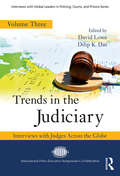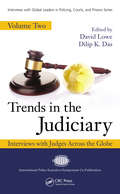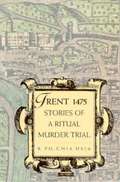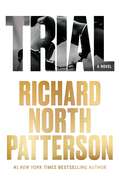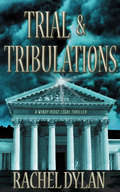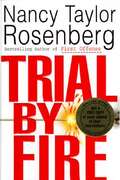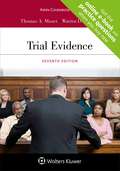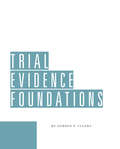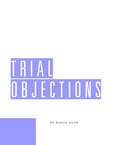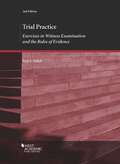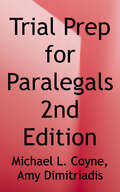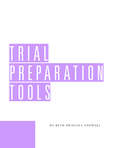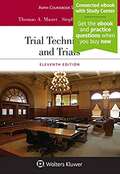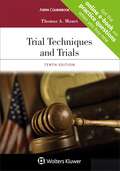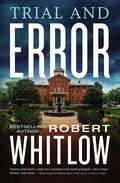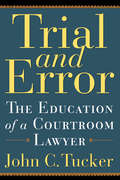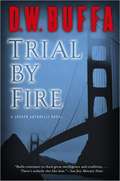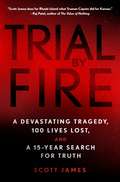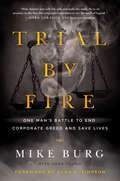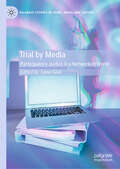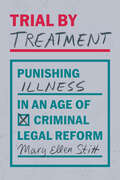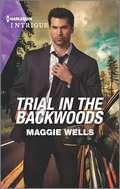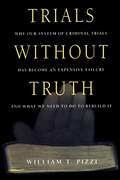- Table View
- List View
Trends in the Judiciary: Interviews with Judges Across the Globe, Volume Three (Interviews with Global Leaders in Policing, Courts, and Prisons)
by David Lowe Dilip K. DasThe third volume in the Interviews with Global Leaders in Policing, Courts, and Prisons series, Trends in the Judiciary: Interviews with Judges Across the Globe, Volume Three provides an insider's view of the judicial system. Offering interviews from judges in Africa, Asia, Australasia, Europe, North America, and the West Indies, this text explores the behind-the-scenes motivations of judges on a global scale, delving into the interviewees opinions on diverse legal systems, the interpretation of legal developments, and current issues in criminal law. Readers of this text will be experience the judicial system from within—the plans, protests, and thought processes of practicing judges. Criminal justice students and practitioners alike will benefit from this unique examination of judges around the world.
Trends in the Judiciary: Interviews with Judges Across the Globe, Volume Two (Interviews with Global Leaders in Policing, Courts, and Prisons)
by David Lowe Dilip K. Das Michael M. BerlinThe term judicial opinion can be a misnomer as rarely are judges true feelings on legal issues and the work they do made available to the public. Judges are constrained when writing decisions to follow the law and leave personal commentary aside. Through a series of revealing interviews, this book gathers empirical data from judges and justices fr
Trent 1475: Stories of a Ritual Murder Trial
by R. Po-chia HsiaOn Easter Sunday 1475, a dead child was found in the cellar of a Jewish family's house in Trent, Italy. Eighteen Jewish men and one Jewish woman were charged with ritual murder. The author reconstructs the events of this tragic persecution.
Trial
by Richard North PattersonTrial confirms Richard North Patterson&’s place as &“our most important author of popular fiction.&”In a propulsive narrative that culminates in a nationally televised murder case, Trial explores America&’s most incendiary flashpoints of race. A Black eighteen-year-old voting rights worker, Malcolm Hill, is stopped by a white sheriff&’s deputy on a dark country road in rural Georgia. His single mother, Allie, America&’s leading voting rights advocate, restlessly awaits his return before police inform her that Malcolm has been arrested for murder. In Washington D.C., the rising, young, white congressman Chase Brevard of Massachusetts is watching the morning news with his girlfriend, only to find his life transformed in a single moment by the appearance of Malcolm&’s photograph. Suddenly all three are enveloped in a media firestorm that threatens their lives—especially Malcolm&’s.
Trial & Tribulations (A\windy Ridge Legal Thriller Ser. #1)
by Rachel DylanA Windy Ridge Legal Thriller #1 High-powered attorney Olivia Murray faces the biggest test of her career when she is assigned to represent Astral Tech, a New Age tech company, in a lawsuit filed by its biggest competitor. While Olivia is accustomed to hard fights in the courtroom, she arrives in Windy Ridge and discovers there is much more to this case than the legal claims--forces of darkness are at work. Windy Ridge quickly turns from quiet Chicago suburb to spiritual battleground, and Olivia must rely on her faith to defend against legal and spiritual attacks. Although they are enemies in the courtroom, Olivia finds a friend and unlikely ally in opposing counsel, Grant Baxter. Once a skeptic about faith, he ultimately comes to her aid when she needs it most. The battle between evil forces heats up in and out of the courtroom, pushing Olivia to the breaking point. Will she be able to help good triumph over evil, or will the town of Windy Ridge be torn apart?
Trial By Fire
by Nancy Taylor RosenbergThe labyrinth of the law, the dark secrets of the human heart, together with the forces of lust, greed, ambition, and power combine to give us a breathless page-turning thriller set in Texas.
Trial Evidence (Aspen Coursebook)
by Thomas A. Mauet Warren D. WolfsonWell-known and experienced authors, highly respected in the clinical field, Thomas A. Mauet and Warren D. Wolfson provide a complete review of the effective use of evidence in a trial setting. Trial Evidence, Seventh Edition is structured around the way judges and trial lawyers think about evidentiary rules, with particular focus on the Federal Rules of Evidence. Abundant real-life courtroom vignettes illustrate how evidentiary issues arise, both before and during a trial. Logical content organization follows the sequence of a trial: opening statement, direct examination, cross examination, and closing arguments. “Law and Practice” sections throughout the book are based on actual federal and state cases and bring decades of practical experience into the evidence classroom. The accessible style of Trial Evidence always focuses on practice over theory, on applying the statute rather than reading it.
Trial Evidence Foundations
by John Tarantino Gordon ClearyRemembering all the elements required to lay a proper foundation can be difficult. Take the simple admission of a letter. First you have to authenticate the document, then demonstrate that it complies with the best evidence rule if its terms are in issue, then show that it is not hearsay if you intend to use its contents. Trial Evidence Foundations is a handy courtroom guide that will keep you from overlooking any required foundational elements, and point out when your opponent has. Gordon P. Cleary and John A. Tarantino's book contains the rule, elements, tactics, and key cases for most foundations, including: Witnesses * Competency * Establishing credibility * Attacking credibility Authentication * Writings * Oral statements * Recordings * Real or physical evidence Hearsay * Admissions * Declarations * Records * Excited utterances Opinion * Lay witnesses * Experts Privileges * Waiver * Specific privileges Designed for use when time is short, the book is formatted for quick reference. Each foundation is tightly covered in three or four pages. 20 sturdy divider tabs, each printed with a foundation category and color-coded, quickly direct you to the correct page. The book is small enough to fit into a trial case and designed to be taken to the courtroom.
Trial Objections
by R. Rogge Dunn Karen Hirschman Michael OropalloMost evidentiary rulings are within the judge's discretion, and are made in seconds. Bad rulings are rarely reversible. As a result, you need to bring all your admissibility ammunition to bear at the moment of objection. Rogge Dunn's Trial Objections increases your firepower with pattern objection language, explanatory comments, tactics for exclusion, arguments for admission, foundational elements, supporting authority, and practice tips for: * Voir dire * Opening statements * Documentary evidence * Demonstrative evidence * Hearsay evidence * Attorney misconduct * Examination of witnesses * Privileges * Closing arguments * And much more! Trial Objections explains when and how to make and meet objections more successfully. This quick-reference book covers the full range of objections, complete with more than 110 pattern objections, tactics, forms, suggested responses, necessary foundations, and hundreds of state and federal cases. It also includes a handy quick reference guide.
Trial Practice: Exercises in Witness Examination and the Rules of Evidence (Coursebook)
by Paul MilichTrial Practice: Exercises in Witness Examination and the Rules of Evidence is a remarkable set of exercises designed for Trial Advocacy courses. This new edition adds coverage of electronic evidence and confrontation clause issues. With special attention paid to the Rules of Evidence, these classroom simulations aim to cultivate students’ skills at witness examination and arguing evidence objections and motions. The text, written in workbook format, contains 35 civil and criminal trial simulations that allow students and professors to see marked improvement in trial skills throughout the course. The hands-on format thoroughly engages students in the subject matter while teaching them practical skills required in legal practice. The comprehensive Teacher’s Manual provides everything necessary to make the class teachable, requiring minimal preparation time from the instructor.
Trial Prep for Paralegals: Effective Case Management and Support to Attorneys in Preparation for Trial (Nita Ser.)
by Michael L. Coyne Amy DimitriadisCoyne and Furi-Perry have created the essential how-to guide for trial preparation. Paralegals will master every stage of litigation, from initial client interviews to pulling together the trial notebook. The book begins with overviews of the litigation process and the evidence rules. Practical skills for interviewing, handling discovery, preparing exhibits, and more are then introduced and explained with examples. Finally, the book stresses the importance of communication and working well with attorneys, clients, courts, and others.
Trial Preparation Tools
by Beth OsowskiCompeting cases and clients can keep you from bringing enough hours, analysis, and organization to readying your cases for trial. Beth D. Osowski's Trial Preparation Tools can help. Use its strategies, tips, forms, checklists, calendars, and idea lists to be better prepared and more efficient. You'll also find tips for effective discovery, picking juries, and proving facts. * Practical checklists: You receive dozens of countdown calendars and to-do checklists that will help you stay organized. * Idea triggers: From theme possibilities through initial opening phrases to sentences for concluding closings, the idea lists will help you brainstorm possibilities for your cases. * Voir dire aids: Learn juror characteristics with the book's voir dire questions and juror questionnaires. Record and analyze your results with her juror selection matrices. * Powerful openings: Sample themes, writing suggestions, and delivery tips help you start persuasively.
Trial Techniques And Trials (Aspen Coursebook Series)
by Thomas A. Mauet Stephen D. EastonBy far the most thorough and detailed of the books in the field, Trial Techniques and Trials is a comprehensive yet concise handbook that covers all aspects of the trial process and provides excellent examples illustrating strategies for opening statements, jury selection, direct- and cross-examination, exhibits, objections, and more. Extensive examples are clustered into three groups: personal injury, commercial, and criminal for ease in finding particular areas of trial practice. Tom Mauet and Steve Easton, renowned for their skills both as writers and trial attorneys, break the trial process down into its critical components for better and quicker comprehension by students and practicing attorneys who have little or no trial experience. <p><p> New to the Eleventh Edition: <p>• Updates regarding recent amendments to the Federal Rules of Evidence <p>• Additional emphasis on presenting evidence and argument visually, not just orally, for modern juries <p>• Coverage of additional aspects of trial including site visits and foundation battles over emails and other electronic communications <p><p>Professors and students will benefit from: <p>• Integrated discussion of the strategy and psychology of persuasion particularly regarding jury selection, opening statements, and closing arguments <p>• Numerous illustrations from tort cases, criminal cases, and commercial trials <p>• Broad and flexible examples that allow readers to focus on either the plaintiffs or the defendants side of the caseor both <p>• Logical organization that follows the chronology of a trial process <p>• A companion website with additional examples, a trial notebook, and other tools for trial lawyers <p>• Video lectures about critical trial moments <p>• Video demonstrations of effective trial advocacy, including a complete jury trial
Trial Techniques And Trials (Aspen Coursebook Series)
by Thomas MauetBuy a new version of this Connected Casebook and receive access to the online e-book, practice questions from your favorite study aids, and an outline tool on CasebookConnect, the all in one learning solution for law school students. CasebookConnect offers you what you need most to be successful in your law school classes—portability, meaningful feedback, and greater efficiency. Trial Techniques and Trials unveils the strategies and thought processes that lawyers use in the courtroom as they present evidence and construct a persuasive argument. Tom Mauet’s clear writing and abundant examples explain and illustrate every step of the jury trial process. Comprehensive yet concise, the Tenth Edition provides authoritative coverage, from opening statements, to jury selection, direct-examination, cross-examination, exhibits, objections, and more. Trial Techniques and Trials, Tenth Edition, features: Integrated discussion of the strategy and psychology of persuasion—particularly regarding jury selection, opening statements, and closing arguments Numerous illustrations from tort cases, criminal cases, and commercial trials Broad and flexible use of examples that allows readers to focus on either the plaintiff’s or the defendant’s side of the case— or both. A logical organization that follows the chronology of a trial process Tear-away checklists for trial preparation and review Lectures on video of critical moments in a trial litigation, now on the companion website, in addition to a jury trial (on video) and a complete trial notebook (with forms)
Trial and Error
by Robert WhitlowA small-town lawyer has been searching for his daughter for eighteen years. Now another young woman is missing, and he&’s determined to find them both—no matter the cost.Buddy Smith built his law practice around tracking down missing children. After all, he knows the agony of being separated from a child. Not long after his daughter&’s birth, her mother ran away and Buddy never saw either one again.Gracie Blaylock has known Buddy her entire life, and now that she is clerk of court for the county, their paths cross frequently. When Gracie hears that a teenager in town has gone missing, she knows Buddy is the one for the case.The girl&’s parents are desperate for answers. Together with Gracie and Mayleah—the new detective in town—Buddy chases all leads, hoping to reach the missing teen before it&’s too late. And as he pursues one girl, he uncovers clues that could bring him closer to the girl he thought he lost forever: his own daughter.Master legal writer Robert Whitlow will keep you guessing in this gripping legal drama while reminding you of the power of God&’s restoration.Stand-alone legal dramaFull-length novel at approximately 120,000 wordsIncludes discussion questions for book clubs
Trial and Error: The Education of a Courtroom Lawyer
by John C. TuckerTrial and Error is a legal memoir that gives an unvarnished account of life as one of America's leading trial lawyers; detailing the path from nervous novice to the top of the legal profession. In 1958, John C. Tucker began a legal career that would lead the Chicago Tribune to call him "one of Chicago's finest and most idiosyncratic trial lawyers. " Now, in a book reminiscent of Scott Turow's classic One L, Tucker employs painstaking honesty and fascinating detail to illuminate the difficult steps in learning the trial trade and the reality of life as one of the country's leading civil and criminal trial lawyers. Free of the impenetrable language and self-congratulation found in the memoirs of many trial lawyers' memoirs, Tucker skillfully chronicles an extraordinary variety of engrossing cases. From the infamous 1969 trial of the "Chicago Eight" war protesters—including Abbie Hoffman, Tom Hayden and Bobbie Seale, heard before the notorious Judge Julius Hoffman—to one of the most important civil rights cases of the era, the Supreme Court decision that spelled the death knell for the corrupt political patronage system in Mayor Daley's Chicago, Tucker's career spanned three decades of legal landmarks. In Trial and Error Tucker becomes the star witness whose crisp prose and penetrating voice carries readers rung by rung up the legal ladder, altering common misconceptions of lawyers and their craft. Relating both the highs and lows, while also recounting tales from the trial of a giant Mafia gambling ring to a legal showdown with heavyweight champion Muhammad Ali, Tucker gives aspiring young attorneys, law students, recent graduates, and all fans of courtroom drama—and comedy—the chance to see it all through the eyes of the man in the middle of the ring.
Trial by Fire
by D. W. BuffaAttorney Joseph Antonelli finds that murder can be a very public affair in this moody and scintillating novel of love, loyalty, and revenge in the Edgar Award-nominated series. Joseph Antonelli's never lost a case he should have won... until now. Julian Sinclair is a brilliant young man--already a law professor at Berkeley and a respected scholar--yet, bored with academic life, he joins the famed defense attorney Joseph Antonelli in private practice. But Sinclair is also a man with powerful emotions he keeps in check. When the beautiful Daphne McMillan, a married district attorney, is murdered, Sinclair is accused of killing her in a fit of jealous rage. Antonelli believes beyond a doubt that this simply isn't possible. Yet Daphne's widowed husband, a man of wealth and privilege, and a master of manipulation, thinks he can sink both this idealistic defendant and the cool Antonelli with one fell swoop. Is Joseph Antonelli in danger of losing more than the case when he baits the real killer to come out of hiding? And when the case is decided and a man is sent to prison, how is Antonelli to know that the real mysteries of the murder are just beginning to be revealed? And that the person no one suspects is the very person even Antonelli should fear the most?
Trial by Fire: A Devastating Tragedy, 100 Lives Lost, and a 15-Year Search for Truth
by Scott JamesIn only 90 seconds, a fire in the Station nightclub killed 100 people and injured hundreds more. It would take nearly 20 years to find out why—and who was really at fault. All it took for a hundred people to die during a show by the hair metal band Great White was a sudden burst from two giant sparklers that ignited the acoustical foam lining the Station nightclub. But who was at fault? And who would pay? This being Rhode Island, the two questions wouldn't necessarily have the same answer.Within 24 hours the governor of Rhode Island and the local police commissioner were calling for criminal charges, although the investigation had barely begun, no real evidence had been gathered, and many of the victims hadn't been identified. Though many parties could be held responsible, fingers pointed quickly at the two brothers who owned the club. But were they really to blame? Bestselling author and three-time Emmy Award-winning reporter Scott James investigates all the central figures, including the band's manager and lead singer, the fire inspector, the maker of the acoustical foam, as well as the brothers. Drawing on firsthand accounts, interviews with many involved, and court documents, James explores the rush to judgment about what happened that left the victims and their families, whose stories he also tells, desperate for justice.Trial By Fire is the heart-wrenching story of the fire's aftermath because while the fire, one of America's deadliest, lasted fewer than two minutes, the search for the truth would take twenty years.
Trial by Fire: One Man's Battle to End Corporate Greed and Save Lives
by Josh Young Alan Simpson Mike BurgIn the face of corporate bullies, one lawyer's passion and persistence paid off.Bullied as a Jewish kid in the hardscrabble neighborhoods of Chicago, Mike Burg had to learn how to fight at a young age. As an adult who started his own law firm from scratch that fire-and understanding of the underdog-still burns and makes him one of America's top trial lawyers fighting for consumers' rights.In Trial by Fire: One Man's Battle to End Corporate Greed and Save Lives, read about Burg's unwavering personal constitution to stand up for the weary, the weak, and the downtrodden at all costs. Follow the justice as he takes on a negligent gas company and wins not only financial settlement for victims but dramatic changes to a city's pipelines to save thousands of lives. Cheer him on as he leads hundreds of individuals against companies shilling drugs such as Fen-Phen, Yaz, Zyprexa, and Pradaxa. Empathize with him as he fights an eight-year battle against UBS Warburg for knowingly selling risky mortgages to investors before collecting compensation. Root him on as he files a sweeping action against 28 California wineries to force them to stop selling toxic wine contaminated with arsenic.Representing everyone from the Little Rascals to Ralph Tamm in the first NFL steroid case, Burg has lived a thousand lives. Trial by Fire shows that, like with every victory in the courtroom, he doubles down for the next adventure. Performing stand-up comedy alongside Roseanne Barr, golfing with Michael Jordan, and attending President George W. Bush's inauguration with President Bush's father, Burg has a story to tell.His undeniably explosive personality and inspiring tale-complete with theatrics, eccentricities, excitement, humor, and maybe just a hint of craziness-will make you laugh, leave you in disbelief, and, most of all, inspire you.
Trial by Jury: The Seventh Amendment and Anglo-American Special Juries
by James OldhamWhile the right to be judged by one's peers in a court of law appears to be a hallmark of American law, protected in civil cases by the Seventh Amendment to the Constitution, the civil jury is actually an import from England. Legal historian James Oldham assembles a mix of his signature essays and new work on the history of jury trial, tracing how trial by jury was transplanted to America and preserved in the Constitution.Trial by Jury begins with a rigorous examination of English civil jury practices in the late eighteenth century, including how judges determined one's right to trial by jury and who composed the jury. Oldham then considers the extensive historical use of a variety of “special juries,” such as juries of merchants for commercial cases and juries of women for claims of pregnancy. Special juries were used for centuries in both English and American law, although they are now considered antithetical to the idea that American juries should be drawn from jury pools that reflect reasonable cross-sections of their communities. An introductory overview addresses the relevance of Anglo-American legal tradition and history in understanding America's modern jury system.
Trial by Media: Participatory Justice in a Networked World (Palgrave Studies in Crime, Media and Culture)
by Lieve GiesThis edited collection brings together scholars from criminology, law, media and communication studies, politics and linguistics to consider the different meanings and dimensions of trial by media. Trial by media remains an under-researched and under-conceptualised phenomenon. This book sheds new light on the complex and evolving interfaces between courts, media and justice. It features original analysis of high-profile cases of media trials including Nicola Bulley (UK), Lindy Chamberlain (Australia), Chris Dawson (Australia), Sanda Dia (Belgium), Dragan Vasiljković (Australia) and Roman Zadorov (Israel). Acknowledging the risks and benefits of heightened media scrutiny of the criminal justice system, the book challenges the notion that trial by media is invariably incompatible with the requirements of natural justice. It also foregrounds ways in which media trials routinely occur in the absence of a legal trial, arguing that there is a need to broaden and rethink the concept of trial by media. The book reflects on the enduring significance of legacy media for public perceptions of the law and the disruptive impact associated with digital media. Furthermore, the collection considers the implications of trial by media for the integrity of court proceedings and the protection of human rights. It offers an assessment of the potential demise of court reporting and its traditional bridging function between courts and public opinion.
Trial by Treatment: Punishing Illness in an Age of Criminal Legal Reform
by Mary Ellen StittA troubling account of the unexpected impacts of treatment-based alternatives to criminal punishment. Every year, courts send hundreds of thousands of people to treatment-based programs as alternatives to traditional punishment. These alternatives—known as ‘diversion programs’—are widely celebrated as reforms that reduce the punishment of the mentally ill. But in Trial by Treatment, Mary Ellen Stitt shows that they have, in fact, expanded the reach of the criminal legal system and its power over the lives of the most vulnerable. The inner workings of diversion programs are obscure, partially by design, and data on outcomes is hard to come by. Stitt draws on two years of fieldwork in criminal courtrooms and court-mandated treatment sessions, as well as an original national dataset, in-depth interviews, and experimental survey data, to document the hidden impacts of diversion. She shows that placing mental healthcare under the control of the courts has helped to legitimize the criminalization of illness, warped treatment environments, and amplified inequalities in punishment. In vivid and humanizing detail, Trial by Treatment shows how reforms that keep power and discretion in the same hands can entrench the very problems they promised to solve.
Trial in the Backwoods (A Raising the Bar Brief #3)
by Maggie WellsA small-town DA faces a deadly threat…And fatherhood. Thanks to the upcoming trial of a millionaire trafficking drugs and humans, Masters County district attorney Harrison Hayes finds himself the target of escalating attacks. So when the woman who once shared his bed blows back into town, claiming to be pregnant with his baby, Harry doesn&’t want her anywhere near a situation that&’s becoming deadlier by the day. But impending motherhood won&’t stop DEA special agent Alicia Simmons from springing into action. As the former lovers join forces, they confront danger from all sides—and an imminent threat that could take them both down…From Harlequin Intrigue: Seek thrills. Solve crimes. Justice served.Discover more action-packed stories in the Raising the Bar Brief series. All books are stand-alone with uplifting endings but were published in the following order: Book 1: An Absence of MotiveBook 2: For the DefenseBook 3: Trial in the Backwoods
Trials Without Truth: Why Our System of Criminal Trials Has Become an Expensive Failure and What We Need to Do to Rebuild It
by William T. PizziUncovers a major deficiency of U.S. criminal justice—a trial system that prioritizes winning over truthReginald Denny. O. J. Simpson. Colin Ferguson. Louise Woodward: all names that have cast a spotlight on the deficiencies of the American system of criminal justice. Yet, in the wake of each trial that exposes shocking behavior by trial participants or results in counterintuitive rulings—often with perverse results—the American public is reassured by the trial bar that the case is not "typical" and that our trial system remains the best in the world. William T. Pizzi here argues that what the public perceives is in fact exactly what the United States has: a trial system that places far too much emphasis on winning and not nearly enough on truth, one in which the abilities of a lawyer or the composition of a jury may be far more important to the outcome of a case than any evidence. How has a system on which Americans have lavished enormous amounts of energy, time, and money been allowed to degenerate into one so profoundly flawed? Acting as an informal tour guide, and bringing to bear his experiences as both insider and outsider, prosecutor and academic, Pizzi here exposes the structural faultlines of our trial system and its paralyzing obsession with procedure, specifically the ways in which lawyers are permitted to dominate trials, the system's preference for weak judges, and the absurdities of plea bargaining. By comparing and contrasting the U.S. system with that of a host of other countries, Trials Without Truth provides a clear-headed, wide-ranging critique of what ails the criminal justice system—and a prescription for how it can be fixed.
Trials for International Crimes in Asia
by Kirsten SellarsThe issue of international crimes is highly topical in Asia, with still-resonant claims against the Japanese for war crimes, and deep schisms resulting from crimes in Bangladesh, Cambodia, and East Timor. Over the years, the region has hosted a succession of tribunals, from those held in Manila, Singapore and Tokyo after the Asia-Pacific War to those currently running in Dhaka and Phnom Penh. This book draws on extensive new research and offers the first comprehensive legal appraisal of the Asian trials. As well as the famous tribunals, it also considers lesser-known examples, such as the Dutch and Soviet trials of the Japanese, the Cambodian trial of the Khmer Rouge, and the Indonesian trials of their own military personnel. It focuses on their approach to the elements of international crimes, and their contribution to general theories of liability. In the process, this book challenges some orthodoxies about the development of international criminal law.
